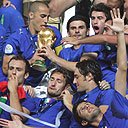
Some body parts can also be used as verbs. For example, in the
Italy-U.S.A. match, De Rossi got a red card for
elbowing McBride in the face. In the morning, when the underground (
AmEng subway) is really crowded, sometimes you have to
elbow people
out of the way to get on or off the train.
If you mix with people of a higher social class than you, however, you wouldn't want to elbow them, but you could
rub elbows with them.

Elbowing people out of the way is a bit aggressive, but
kneeing a man in his "privates" is even more so. This might not get you on the train, but it could save your life if attacked on a dark street at night.
When you go down on your knees, say to
pray or to propose to somebody (ask them to marry you), this is called
kneeling.

A very important skill for a footballer is being able to
head the ball in the direction you want it to go. A painful skill perfected by football hooligans is
headbutting (hitting someone with your head) each other. However, headbutting can also be used as a
self-defence (
AmEng defense) technique.
Another way to say that you are going somewhere or in a certain direction, is to say that you are heading there, or in that way. For example, "I'm heading into town if you want a lift." (To give someone a lift or a ride is to take them somewhere in your car.)
Labels: body parts, expressions, sports
 It hasn't been such a great Tour for the Aussies, but Australia's Special Broadcasting Service site has some excellent coverage of the different stages and the Tour in general, including video and audio. There are also some hilarious short promotional videos by one of my favourite [AmEng favorite] riders, sprinter Robbie McEwen, who unfortunately is out of the race at this stage.
It hasn't been such a great Tour for the Aussies, but Australia's Special Broadcasting Service site has some excellent coverage of the different stages and the Tour in general, including video and audio. There are also some hilarious short promotional videos by one of my favourite [AmEng favorite] riders, sprinter Robbie McEwen, who unfortunately is out of the race at this stage.











